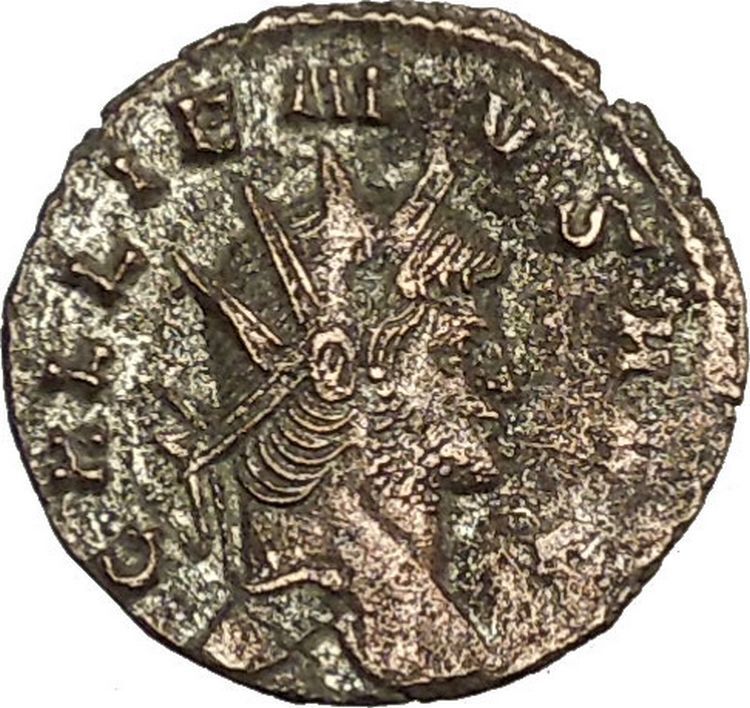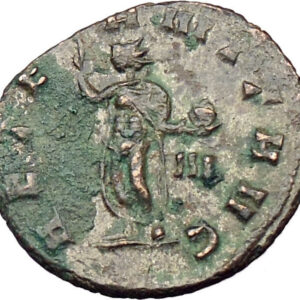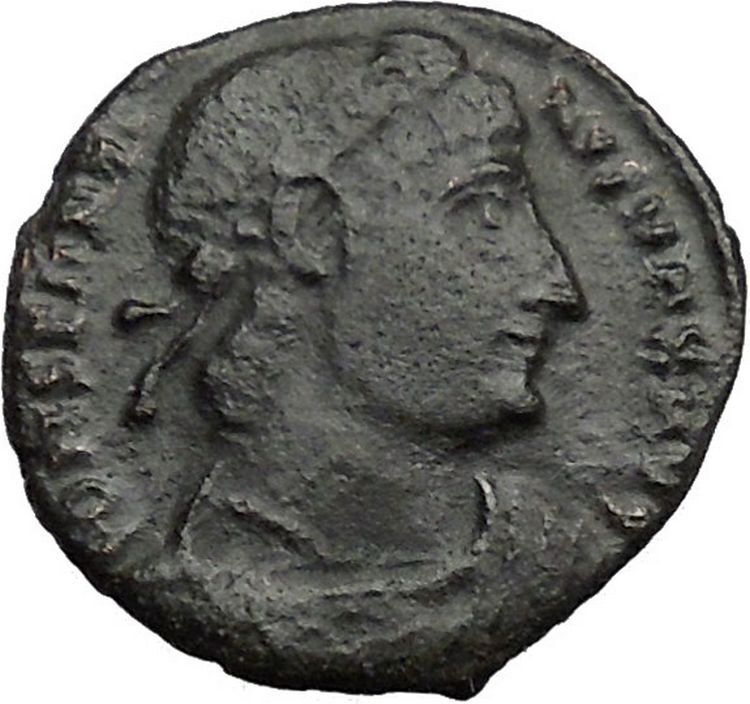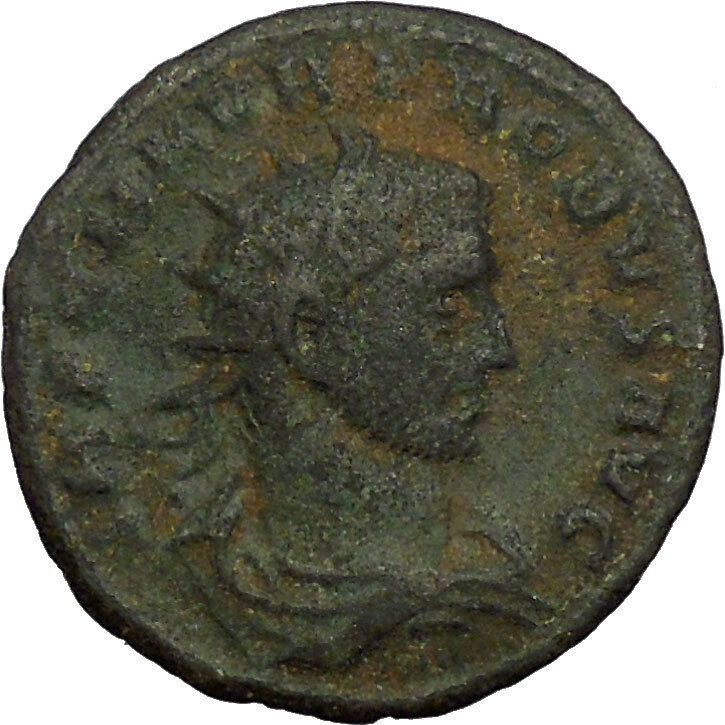|
Probus – Roman Emperor: 276-282 A.D.
Bronze Antoninianus 24mm (4.20 grams) Struck 277 A.D.
Reference: RIC 810h, C 904
IMPCMAVRPROBVSPAVG – Radiate bust left, wearing imperial mantle and scepter with eagle atop.
VIRTVSPROBIAVG Exe: XXI – Mars advancing right, holding spear and trophy.
You are bidding on the exact item pictured, provided with a Certificate of Authenticity and Lifetime Guarantee of Authenticity.
 Mars was the Roman god of war, the son of Juno and Jupiter, husband of Bellona, and the lover of Venus. He was the most prominent of the military gods that were worshipped by the Roman legions. The martial Romans considered him second in importance only to Jupiter (their main god). His festivals were held in March (named for him) and October. As the word Mars has no Indo-European derivation, it is most likely the Latinised form of the agricultural Etruscan god Maris. Initially Mars was a Roman god of fertility and vegetation and a protector of cattle, fields and boundaries and farmers. In the second century BC, the conservative Cato the Elder advised “For your cattle, for them to be healthy, make this sacrifice to Mars Silvanus you must make this sacrifice each year”. Mars later became associated with battle as the growing Roman Empire began to expand, and he came to be identified with the Greek god Ares. Unlike his Greek counterpart, Mars was generally revered and rivaled Jupiter as the most honoured god. He was also the tutelary god of the city of Rome. As he was regarded as the legendary father of Rome’s founder, Romulus, it was believed that all Romans were descendants of Mars. Mars was the Roman god of war, the son of Juno and Jupiter, husband of Bellona, and the lover of Venus. He was the most prominent of the military gods that were worshipped by the Roman legions. The martial Romans considered him second in importance only to Jupiter (their main god). His festivals were held in March (named for him) and October. As the word Mars has no Indo-European derivation, it is most likely the Latinised form of the agricultural Etruscan god Maris. Initially Mars was a Roman god of fertility and vegetation and a protector of cattle, fields and boundaries and farmers. In the second century BC, the conservative Cato the Elder advised “For your cattle, for them to be healthy, make this sacrifice to Mars Silvanus you must make this sacrifice each year”. Mars later became associated with battle as the growing Roman Empire began to expand, and he came to be identified with the Greek god Ares. Unlike his Greek counterpart, Mars was generally revered and rivaled Jupiter as the most honoured god. He was also the tutelary god of the city of Rome. As he was regarded as the legendary father of Rome’s founder, Romulus, it was believed that all Romans were descendants of Mars.

Probus (Latin: Marcus Aurelius Probus Augustus; c. 19 August 232 – September/October 282), was Roman Emperor from 276 to 282.
During his reign, the Rhine and Danube frontier was strengthened after successful wars against several Germanic tribes such as the Goths, Alamanni, Longiones, Franks, Burgundians, and Vandals. The Agri Decumates and much of the Limes Germanicus in Germania Superior were officially abandoned during his reign, with the Romans withdrawing to the Rhine and Danube rivers.
Early life
Born in 232 in Sirmium (modern day Sremska Mitrovica), Pannonia Inferior, the son of Dalmatius.
Military career
Probus entered the army around 250 upon reaching adulthood. Appointed as a military tribune by the emperor Valerian, he later distinguished himself under the emperors Aurelian and Tacitus. He was appointed governor of the East by Tacitus, whose death in 276 prompted Probus’ soldiers to proclaim him emperor.
Florianus, the half-brother of Tacitus, was also proclaimed successor by his soldiers, but he was killed after an indecisive campaign. Probus travelled west, defeating the Goths along the lower Danube in 277, and acquiring the title of Gothicus. His position as emperor was ratified by the Senate around this time.
As emperor

Sculpted head of Probus from Brescia in northern Italy.
In 278, Probus campaigned successfully in Gaul against the Alamanni and Longiones; both tribes had advanced through the Neckar valley and across the Rhine into Roman territory. Meanwhile, his generals defeated the Franks and these operations were directed to clearing Gaul of Germanic invaders (Franks and Burgundians), allowing Probus to adopt the titles of Gothicus Maximus and Germanicus Maximus.
One of his principles was never to allow the soldiers to be idle, and to employ them in time of peace on useful works, such as the planting of vineyards in Gaul, Pannonia and other districts, in order to restart the economy in these devastated lands. Of a greater and more lasting significance, Probus began the strategy of settling the Germanic tribes in the devastated provinces of the empire.
In 279-280, Probus was, according to Zosimus, in Raetia, Illyricum and Lycia, where he fought the Vandals. In the same years, Probus’ generals defeated the Blemmyes in Egypt. Probus then ordered the reconstruction of bridges and canals along the Nile, where the production of grain for the Empire was centered.
In 280-281, Probus put down three usurpers, Julius Saturninus, Proculus and Bonosus. The extent of these revolts is not clear, but there are clues that they were not just local problems (an inscription with the name of Probus erased has been found as far as Spain). In 281, the emperor was in Rome, where he celebrated his triumph.
Probus was eager to start his eastern campaign, delayed by the revolts in the west. He left Rome in 282, travelling first towards Sirmium, his birth city.
Assassination
Different accounts of Probus’s death exist. According to Joannes Zonaras, the commander of the Praetorian Guard Marcus Aurelius Carus had been proclaimed, more or less unwillingly, emperor by his troops.
Probus sent some troops against the new usurper, but when those troops changed sides and supported Carus, Probus’ remaining soldiers assassinated him at Sirmium (September/October 282). According to other sources, however, Probus was killed by disgruntled soldiers, who rebelled against his orders to be employed for civic purposes, like draining marshes. Carus was proclaimed emperor after Probus’ death and avenged the murder of his predecessor.
|





 Mars was the Roman god of war, the son of Juno and Jupiter, husband of Bellona, and the lover of Venus. He was the most prominent of the military gods that were worshipped by the Roman legions. The martial Romans considered him second in importance only to Jupiter (their main god). His festivals were held in March (named for him) and October. As the word Mars has no Indo-European derivation, it is most likely the Latinised form of the agricultural Etruscan god Maris. Initially Mars was a Roman god of fertility and vegetation and a protector of cattle, fields and boundaries and farmers. In the second century BC, the conservative Cato the Elder advised “For your cattle, for them to be healthy, make this sacrifice to Mars Silvanus you must make this sacrifice each year”. Mars later became associated with battle as the growing Roman Empire began to expand, and he came to be identified with the Greek god Ares. Unlike his Greek counterpart, Mars was generally revered and rivaled Jupiter as the most honoured god. He was also the tutelary god of the city of Rome. As he was regarded as the legendary father of Rome’s founder, Romulus, it was believed that all Romans were descendants of Mars.
Mars was the Roman god of war, the son of Juno and Jupiter, husband of Bellona, and the lover of Venus. He was the most prominent of the military gods that were worshipped by the Roman legions. The martial Romans considered him second in importance only to Jupiter (their main god). His festivals were held in March (named for him) and October. As the word Mars has no Indo-European derivation, it is most likely the Latinised form of the agricultural Etruscan god Maris. Initially Mars was a Roman god of fertility and vegetation and a protector of cattle, fields and boundaries and farmers. In the second century BC, the conservative Cato the Elder advised “For your cattle, for them to be healthy, make this sacrifice to Mars Silvanus you must make this sacrifice each year”. Mars later became associated with battle as the growing Roman Empire began to expand, and he came to be identified with the Greek god Ares. Unlike his Greek counterpart, Mars was generally revered and rivaled Jupiter as the most honoured god. He was also the tutelary god of the city of Rome. As he was regarded as the legendary father of Rome’s founder, Romulus, it was believed that all Romans were descendants of Mars.






